Oil Fields from Space at Night
http://geology.com/articles/oil-fields-from-space/
The night lights of drilling and natural gas flaring make these oil fields visible from space at night.
All images from the NASA Suomi satellite in April and October 2012.
Bakken Formation - North Dakota and Canada |
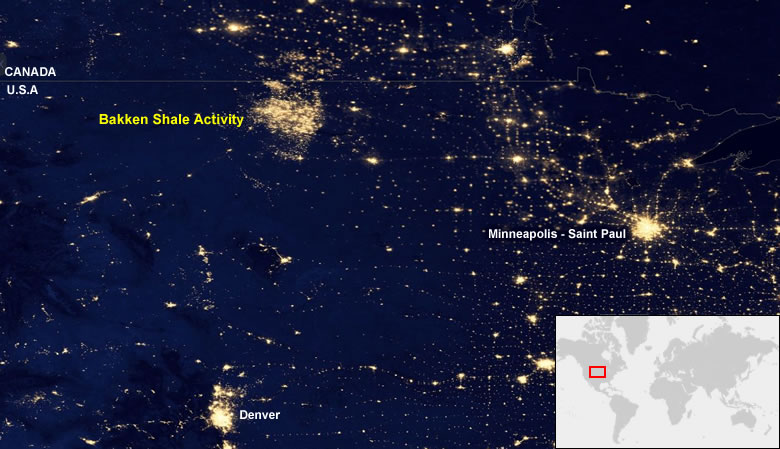
| The Bakken Formation supports an unconventional oil and natural gas play in North Dakota and Canada. The main product is oil, but most wells also yield natural gas that has few local markets, storage options or pipelines. Much of that natural gas is flared. Image from NASA. |
Eagle Ford Shale of Texas |
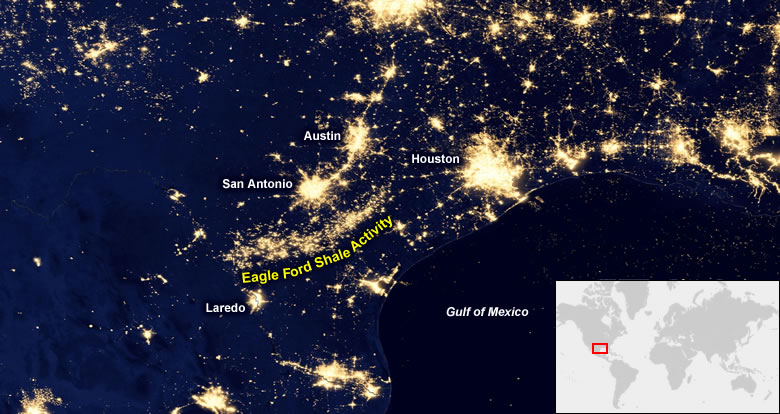
| The Eagle Ford Shale of Texas has been the fastest growing area of oil drilling activity in the state. A crescent-shaped area of drilling activity north of Laredo and South of San Antonio produces a significant amount of light from well site illumination and natural gas flaring. Image from NASA. |
North Slope, Alaska |
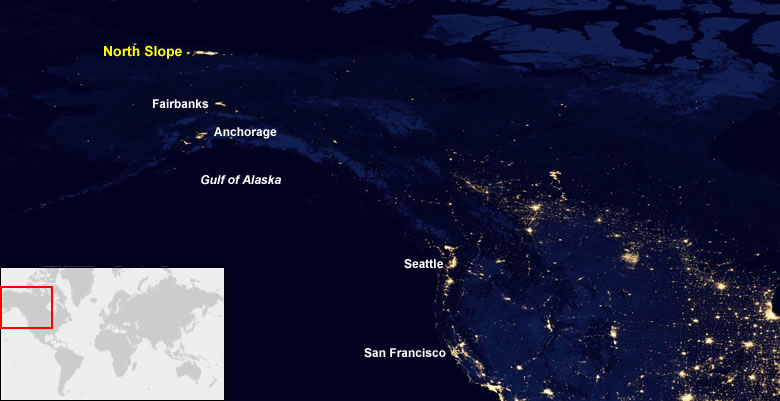
| The North Slope of Alaska is the collection area for the Trans-Alaska Pipeline System, the location of the famous Prudhoe Bay Oil Field and the National Petroleum Reserve. The North Slope produces significant amounts of conventional oil that is transported to southern Alaska through the pipeline. The North Slope has a significant amout of night time illumination at drill sites, pipeline facilities, and natural gas flaring. Image from NASA. |
United States Gulf of Mexico |
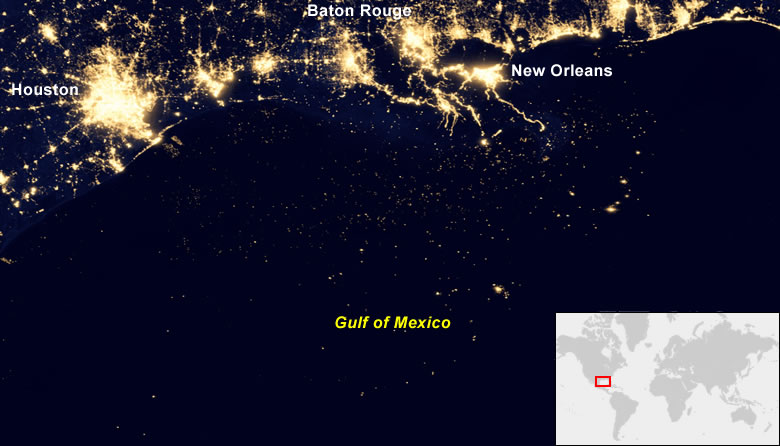
| The hundreds of tiny dots of light in the Gulf of Mexico represent night time illumination from oil platforms where drilling and collection activities are taking place. Many of these flare natural gas that can not be stored, used or transported to market. Image from NASA. |
Mexican Gulf Coast |
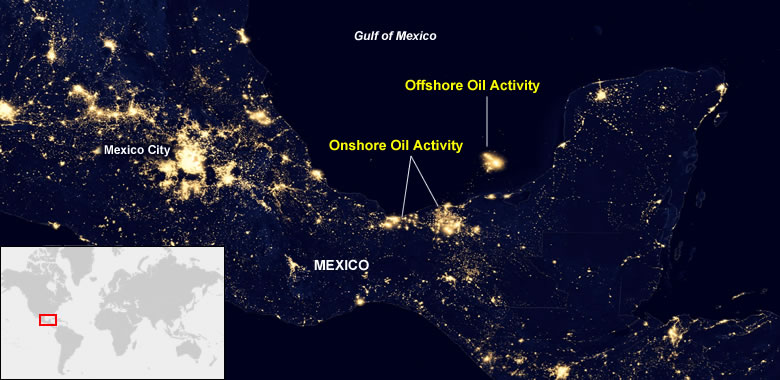
| Mexico is one of the ten top oil-producing countries in the world. The Mexican Gulf Coast and the Bay of Campeche host a large amount of onshore oil activity and shallow-water offshore drilling. These facilities have a large amount of night illumination and natural gas flaring. Image from NASA. |
Orinoco Oil Field, Venezuela |

| Venezuela is the world's eighth largest exporter of oil and a leading exporter of oil to the United States. It has some of the largest oil and natural gas reserves in the world. Oil and natural gas are produced in many parts of the country, and activity in the Orinoco Oil Field is especially obvious on the NASA night time illumination map. Image from NASA. |
Campos and Santos Offshore Basins of Brazil |

| Brazil is the largest producer of liquid fuels in South America. About 90% of Brazil's oil production is from deep water drilling in the Atlantic Ocean with most of the production in the Campos and Santos offshore basins. Much of the natural gas produced in these basins is flared. Image from NASA. |
North Sea |
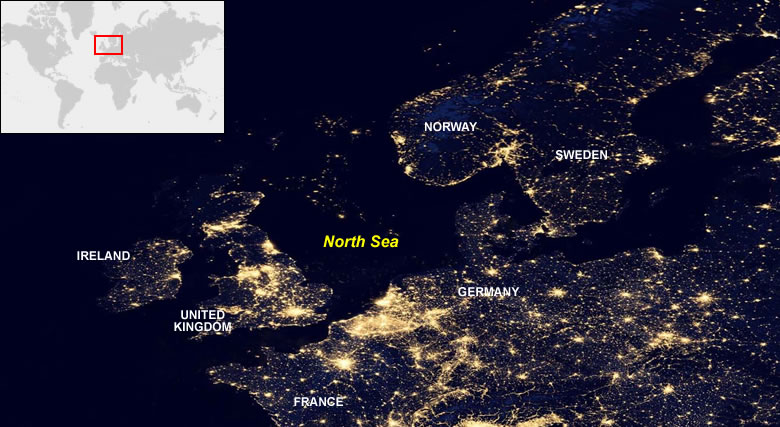
| The North Sea is one of western Europe's largest sources of oil and natural gas and one of the world's most important non-OPEC sources of fossil fuels. The small dots of light in the North Sea above are oil activity sites illuminated at night or where natural gas flaring occurs. Image from NASA. |
Algeria and Libya |
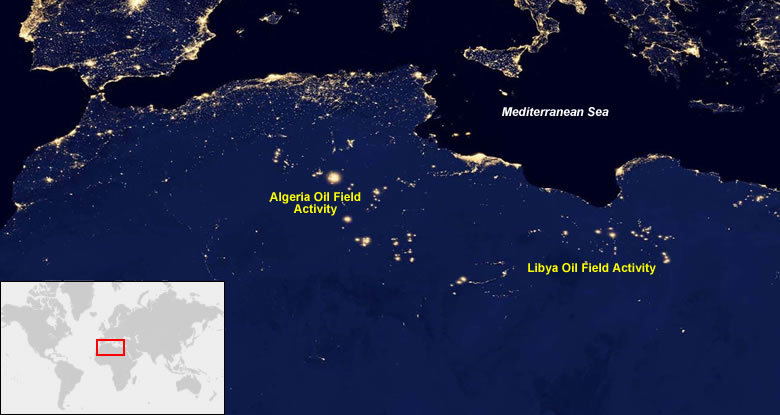
| Algeria and Libya both have a large number of onshore oil exploration, production and processing facilities. The map above shows areas illuminated at night by electricity or natural gas flaring. Image from NASA. |
Nigeria and Western Africa |
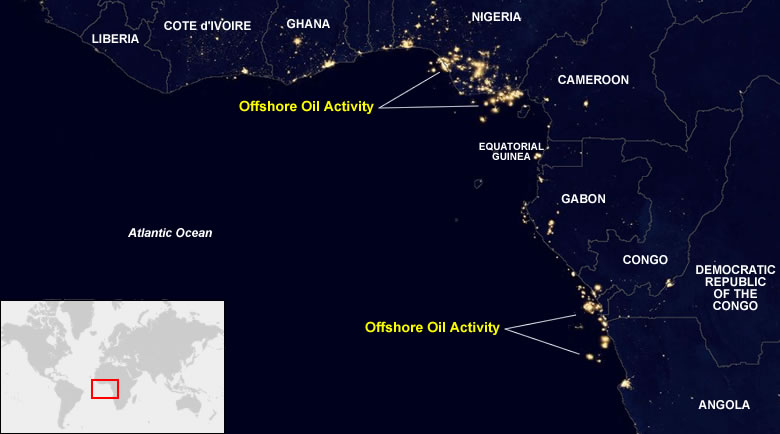
| Nigeria is the largest producer of oil in Africa. Much of that production is offshore and in the Niger Delta where exploration, production, processing and transport facilities are illuminated at night and where lots of natural gas is flared because it lacks a local market or transport options. There are also numerous locations of oil activity offshore of Angola, Congo and Gabon. Image from NASA. |
Persian Gulf |
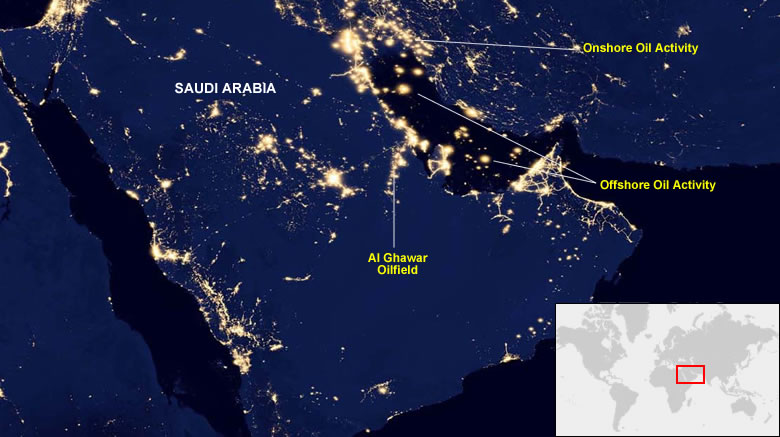
| The Persian Gulf is one of the most active places in the world for oil activity. There are thousands of exploration, production, processing, transport and refining facilities operating there at any time. The image above shows numerous onshore and offshore locations as well as the Al Ghawar Oilfield of Saudi Arabia. Image from NAS |
Tags:
Replies to This Discussion
Support GoHaynesvilleShale.com
Top Content
Groups
-
WESTERN HAYNESVILLE
17 members
-
Natchitoches Parish
405 members
-
Bienville Parish, LA
249 members
-
SMACKOVER LITHIUM GROUP …
10 members
-
SONRIS Help Center
255 members
-
Sabine Parish, LA
456 members
-
Evangeline Parish
17 members
-
SMACKOVER LITHIUM GROUP …
8 members
-
North LA Cotton Valley C…
67 members
-
Webster Parish
301 members
Blog Posts
Tuscaloosa Trend Sits On Top Of Poorest Neighbourhood For Decades - Yet No Royalties Ever Paid To The Community -- Why??
In researching the decades-old Tuscaloosa Trend and the immense wealth it has generated for many, I find it deeply troubling that this resource-rich formation runs directly beneath one of the poorest communities in North Baton Rouge—near…
ContinuePosted by Char on May 29, 2025 at 14:42 — 4 Comments
Not a member? Get our email.
© 2026 Created by Keith Mauck (Site Publisher).
Powered by
![]()
| h2 | h2 | h2 |
|---|---|---|
AboutAs exciting as this is, we know that we have a responsibility to do this thing correctly. After all, we want the farm to remain a place where the family can gather for another 80 years and beyond. This site was born out of these desires. Before we started this site, googling "shale' brought up little information. Certainly nothing that was useful as we negotiated a lease. Read More |
Links |
Copyright © 2017 GoHaynesvilleShale.com
